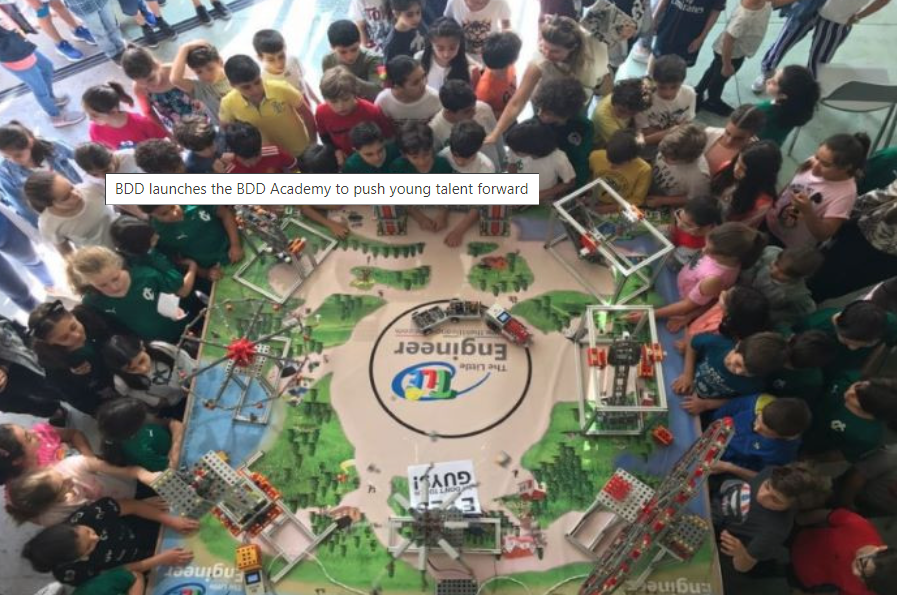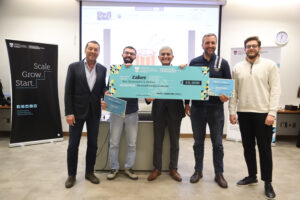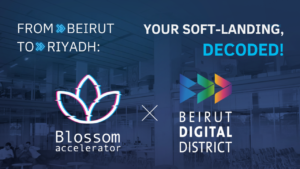Today’s classrooms demand far more sophistication to match the marketplace’s ever growing needs.
Coding, programming, robotics, computer science, emotional intelligence and other subjects are no longer optional subjects and parents must keep an open mind when it comes to investing in their kids’ tech, design and leadership skill sets.
One initiative is hoping to be the go-to option for parents and employers: BDD Academy. “We were hearing from our startups [about] a struggle to find the right or experienced talent that has the skills (soft and technical) required for their success, especially for new recruits coming out of universities,” said Mouhamad Rabah, General Manager of ZRE, on the reason why the academy was launched. In the next five years, he hopes BDD Academy will become the destination of choice for “schools and universities students, and corporations resources to complement their acquired knowledge with the needed technical and soft skills to become more employable and ready for the jobs of the future.”
Launched in 2018, this BDD initiative has four main tracks on its agenda: youth, university, continuous learning and corporate innovation. Each of the different learning programs tackle one of aforementioned tracks.
“BDD [Beirut Digital District] has been supporting the technology ecosystem across different dimensions, from hosting and sponsoring different accelerators and education programs, and co-organizing mentorship and entrepreneurship events,” said Elias Boustani, who works as a strategy and innovation consultant and is leading the design and launch of the BDD Academy. “Now it is structuring all of this support under the BDD Academy umbrella, by sourcing high quality programs, packaging and marketing them and maximizing their impact while making sure the latter is properly measured.”
The youth track prepares kids for the future jobs, while the university track was developed after many startups complained about the inadequacy of traditional education systems to the job requirements of the BDD community, as explained by Boustani. The goal of this track is to provide internship programs for universities along with career orientation and practical skill building for students. The continuous learning track targets startups and corporations’ employees looking to upgrade their skills and the corporate innovation track helps corporations and traditional businesses enter the digital space.
To launch its summer agenda the youth track, the Academy teamed up with four educational entities: The Little Engineer, Teens Who Code, Coder Maker and Maker’s Hub.
We had to chance to meet with some of the people behind these initiatives and talk to them about the program’s impact, main learning points, turnout, feedback and how working with BDD added value to the community.
BDD: What is The Makers Hub and how did it start?
Sabine El Kahi – Founder and Managing Director: The Makers Hub is a makerspace for youth aged older than 7 years, where they can develop skills and knowledge in hardware technologies through hands-on project. Participants learn about manufacturing, electronics and programming micro-controllers, 3D design, 3D printing and 3D scanning, mold making and even art topics such ceramics and knitting. The idea started from the need of raising a maker culture among youth so that they conceive technology as a tool not just a product. In 2014, we established Kids Genius which focused as a start on woodworking. Through time, we enlarged the topics we cover in the hardware tech field and kids who joined at that time are now teenagers who wanted to keep joining our space but had some concerns about the name. In addition to our summer program and after-school activities, we currently work with schools and design classes related to the Lebanese curriculum with hands-on activities and exposure hardware. We have also worked with the special education sector and impacted many students who have learning difficulties.
Now we are in the process of providing classes for makers starting 12+ years old. Kids Genius will still be provided for kids between 7 and 11 under umbrella of The Makers Hub. We are 4 full timers: two engineers, an educational technologist and a maker, in addition to 5 part timers university students and makers who were already enrolled in our program for the past 4 years.
BDD: What were the main objectives of the program?
Sabine El Kahi: Our target is that students learn to use different hardware technologies for a final project and conceive technology as a tool to implement their creative ideas instead of being mere consumers. At the same time, being exposed to different technologies will help them in future projects to be able to choose the best process to making their idea tangible and functional.
We collaborated with Teens Who Code where around 30 students joined our woodworking and 3D design and 3D printing courses. We had 20 young makers who joined our summer program at BDD, some for the whole month and others for specific weeks.
BDD: What was the parents’ feedback?
Sabine El Kahi: Many parents loved the idea of having a makerspace for youth that is safe for their age, where they can build and produce items and projects using technology. A lot of them appreciated the fact that through our concept, students build motor skills and learn about different manual and computerized machines and operate them to produce parts they need. They also learn about programming micro-controllers and actually develop perseverance and analytical skills to solve design challenges and build their solutions
BDD: How did the program’s location impact attendance?
Sabine El Kahi: The location in BDD brought more value. First our program was shared with a large community of members from BDD which increased the awareness about our program and brought new clients to our concept and second, the location is accessible for the parents in Beirut who knew previously about our program but couldn’t make it to our location in Nahr El Mot.
BDD: Tell us a bit about the early beginnings of Coder Maker
Emilio Abi Khalil – Country Coordinator Coder-Maker Program: Coder-Maker is a non-profit social program aiming to empower a new generation of programmers and creators. The program has three main partners: International Education Association (IEA), Mouna Bustros Foundation and Beirut Digital District (BDD).
Our main objective is to spread the use of technology in public schools all over Lebanon, using the Raspberry Pi (small single-board computers for teaching basic computer science in schools and in developing countries), so that students can transform their creative ideas into reality. Coder Maker is also a community which gathers tech enthusiasts of all ages and backgrounds who not only want to learn coding but also want a place to grow, share, and create new things for the betterment of the world.
BDD: You provide several programs for each age group. What do these programs offer?
Emilio Abi Khalil: During the summer camp at BDD, three teams were formed and divided based on age groups:
1- 8 to 10: Participants were introduced to Scratch (MIT’s drag and drop Visual
Programming Software)
2- 11 to 12: Children learned how to handle electronics using Scratch GPIO (a version that allows programmers to use wiring and run LED lights, sensors, motors, etc.)
3- 13 to 18: Youth acquired how to code using Python (now the leading open source language in the world).
Students created their fantastic innovations using electronics and more sophisticated programming.
BDD: What were the main learning points that the program touched upon?
Emilio Abi Khalil: Coder-Maker introduced the volunteering program two years ago where university students lead the charge in spreading technology. This is done by having a volunteer grooming phase where they will learn the material and how to teach it. Our progress skyrocketed thanks to the dedication, commitment, and enthusiasm of the volunteers. This is why we, as the IEA team created the Coder-Maker Club as a learning experience for the volunteers. The Club would allow the volunteers to get into the administrative experience, an experience that would set them up for their future career.
BDD: What were some of the interesting ideas that participants developed?
Emilio Abi Khalil: Students were finally able to turn the ideas that they had in mind into prototypes that included a smart swimming pool that notifies parents when a child is in danger; a robot that delivers medications to hospital patients automatically; a computer game that highlights the importance of recycling and another game that raises awareness of the dangers of deforestation. Parents were amazed by the hidden talents of their children and the amazing capacities to produce innovative applications and not just to consume ready-made ones.
BDD: How did The Little Engineer start?
Rana El Chemaitelly: I launched The Little Engineer (TLE) venture in Beirut, with the aim to protect my 3 kids and the future generation from being addicted to the TV, Internet and Electronic games. We are focusing on educating young minds (aged from 6 to 18) and preparing them for the challenging future, by raising public awareness and appreciation of Science, Technology, Engineering and Mathematics with focus on robotics, renewable energy and environmental related sciences
BDD: What are the different programs that you offer at BDD?
Rana El Chemaitelly: The Little Engineer summer camp is ongoing until early September and is divided into many groups and programs:
1- Summer STEM camp: It is a 5-week program that teaches Electronics, Robotics, Solar Energy, Architecture, Civil Engineering, Aviation, 3D Printing and Designing, Pneumatics, Wind Energy, Coding and Automation
2- Journey with an Engineer and Internet of Things Certification camp which teaches students Mechatronics, Mechanical, Civil and Electronics, with real engineers from the field.
3- Unbeatable Summer Camp: The Little Engineer x SpicaTech Academy
Spica Tech and TLE are providing courses focusing on game production including game design, game art, programming and publishing.
BDD: What were the main learning points that the programs touched upon?
Rana El Chemaitelly: The Little Engineer started its 2018 summer camp programs in June at the Beirut Digital District. The main learning points that the programs touched upon are: mechanical engineering, robotics, renewable energy, electronics assembly and connections, programming, project management, app development, internet of things, civil engineering and its main concepts.
The camp received children of all age groups going from 6-8, 9-11, 12-14 and 15+. 41 students registered in our camp programs, 15 students joined our courses and 6 students joined our camps on a daily basis.
BDD: What added value did the camp’s location at BDD bring you?
Rana El Chemaitelly: Surely the BDD community is an added value to the summer camp; the kids share all the interests of the BDD, while getting exposed to the community life. The marketing and the name of the place is a plus. The kids love the community, they feel safe, relaxed and in a place where they enjoy freedom and the involvement in the youth development and the ecosystem.
BDD: What’s next for you?
Rana El Chemaitelly: We aim at making all learners and students in Lebanon ready for the 4th industrial revolution by benefiting them from the knowledge of technology and Robotics. We yearn to implement Technology and STEM learning as a full course in the Lebanese curriculum for all public and private schools, from Grade 1 to grade 12. TLE is committed to be the voice of change in the Arab World by investing in young minds and preparing future leaders for the challenge. So MENA region is on our list of goals and objective. On a more visible and specific level, TLE has equipped an estimated 3,700 learners from 10 different public schools with job-ready skills by donating to accommodate full laboratories.
Teens Who Code is the fourth entity that BDD worked with for the summer camp programs. It is a coding academy for kids and teenagers, teaching mobile game and software development, woodworking, creative writing, engineering and construction and robotics. TeensWhoCode organize field trips to tech and digital companies in Lebanon to help students with their career path and match them with potential internship opportunities.
It might take these kids and teenagers some time before coming up with a functional product, yet the skill sets and the knowhow they develop during these trainings will push them closer towards that goal. Until then, they must be provided with continuous learning trainings and this is a mission BDD Academy is seriously taking upon.
“The BDD Academy main objective is to Bridge the gap between Academia and Business in order to retain local talent and help companies become more competitive thus growing the digital, creative and knowledge economy in Lebanon,” concluded Rabah.




